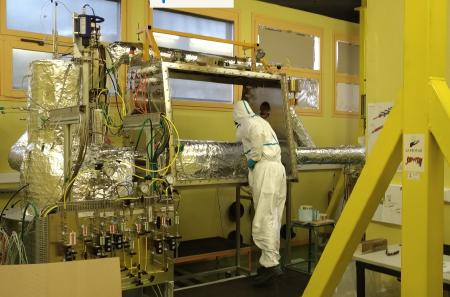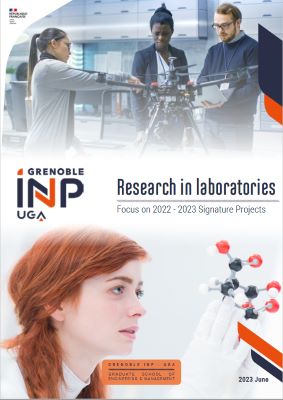Fossil fuels currently supply 80% of the world’s energy. This percentage is a little lower in France (60%), where nuclear power plants supply the majority of the country’s electricity. Yet this percentage is still too high. Under its energy transition framework, France aims to reach carbon neutrality by 2050. This will require the development of renewable energies, including solar and wind power.
Continued global reliance on fossil fuels is linked to how easy they are to transport and use. For example, combustion engine cars are easy to start, even during the winter, which will likely not be the case for electric cars. Research is therefore being carried out to develop renewable energy carriers, including electricity, agrofuel, biogas, hydrogen and heating networks. These are all major priority areas for Grenoble INP - UGA.
Nuclear power is back in fashion
Research carried out on nuclear energy at Grenoble INP - UGA focuses on several areas, including modelling innovative reactors to simulate their design and conduct preliminary safety reports, and upstream research topics in the fields of nuclear physics and thermodynamics. Because effective modelling requires comparison with real conditions, LPSC* also carries out small-scale experiments in reactors. Researchers are also working with industrial partners on calculation tools aimed at simulating the operations of current reactors to make them faster, more precise and increase operating margins by helping them run better and improving the efficiency of the fuel.
“We conduct experiments on thermal hydraulics, nuclear physics, on the reactors’ performance in the lab, and then create models integrating all these aspects,” says Adrien Bidaud, a researcher at LPSC, professor at Grenoble INP – Phelma, UGA, and Head of the school’s Energy and Nuclear Engineering programme. With around one hundred Master’s and engineering graduates per year, Grenoble INP - UGA is one of the largest training centres for nuclear engineering and materials for the nuclear industry.
Grenoble INP - UGA also helps students develop their skills in the field of electricity, which is difficult to store yet easy to produce using renewable energies. Issues in this area include flexibility, network management and use, with the goal of maintaining a balance between production and consumption. Researchers at Grenoble INP - UGA laboratories are conducting considerable studies on smart grids, the renewable energy variability, as well as storage issues, including work on hydrogen and batteries at LEPMI**, a lab which has earned international recognition in this area.
“I am personally working part time in the area of energy forecasting with GAEL*** lab” Adrien Bidaud says
. “We use specialised software to simulate the detailed energy production, transport and consumption processes in several dozen groups of countries based on each one’s potential and energy policies. This allows us to anticipate trajectories that help us plan for the future."
Tailored training courses

This preparation for the future seems to involve entirely changing the energy model over the course of the next ten years. This will of course require more skills, a need that has motivated the creation of the European RES4CITY project coordinated by Maynooth University’s School of Business in Ireland. The initiative aims to offer training courses that will reduce the gap between available skills and local needs for heating and electric network operators and installers of renewable energy production systems in order to meet national energy and climate targets.
Grenoble INP - UGA is providing the necessary skills for this project, which will offer online continuing education modules aimed at developing professionals’ skills in their fields.
“We will work together with GAEL lab to offer microcredits to finance flexible, remote training courses in the areas of energy forecasting and economic models,” Adrien Bidaud says.
“We have ideas for interdisciplinary case studies that will enrich these courses.” One such case study is a waste heat recovery project led by LNCMI****, which aims to recover energy generated by the lab to heat Grenoble’s Polygone Scientifique neighbourhood, a move away from the current practise of releasing it into the Isère river.
“Students have generally expressed great interest in cross-disciplinary courses that provide a link between their initial training and climate efforts.”
*Laboratory of Subatomic Physics & Cosmology (CNRS, Grenoble INP – UGA, UGA)
**Laboratory of Electrochemistry and Physical-Chemistry of Materials and Interfaces (CNRS, Grenoble INP – UGA, UGA, Université Savoie Mont-Blanc)
***Grenoble Applied Economics Lab (CNRS, Grenoble INP – UGA, Inrae, UGA)
****National High Magnetic Field Laboratory (CNRS, EMFL, UGA, Insa Toulouse, Université Toulouse III)




 This preparation for the future seems to involve entirely changing the energy model over the course of the next ten years. This will of course require more skills, a need that has motivated the creation of the European RES4CITY project coordinated by Maynooth University’s School of Business in Ireland. The initiative aims to offer training courses that will reduce the gap between available skills and local needs for heating and electric network operators and installers of renewable energy production systems in order to meet national energy and climate targets.
This preparation for the future seems to involve entirely changing the energy model over the course of the next ten years. This will of course require more skills, a need that has motivated the creation of the European RES4CITY project coordinated by Maynooth University’s School of Business in Ireland. The initiative aims to offer training courses that will reduce the gap between available skills and local needs for heating and electric network operators and installers of renewable energy production systems in order to meet national energy and climate targets.